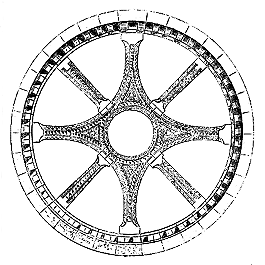Annual Conference 2025 - Call for Papers
News: September 29, 2024
The International Medieval Society-Paris
18th Annual Conference
July 3-5, 2025, Paris
“Medieval Communities”
Deadline for Abstracts:
December 1, 2024
Keynote Addresses:
“Jehanne la Fouaciere: Parisian widow, linen merchant — and Beguine?”
Sharon Farmer
Department of History
University of California, Santa Barbara
“Les chanoines de Saint-Hilaire de Poitiers et leur saint patron au XIe siècle : une mise en images dans l’espace ecclésial de la communauté autour du fondateur de l’Église locale”
Cécile Voyer
Centre d’Etudes supérieures de civilisation médiévale
l’Université de Poitiers
How did people in the Middle Ages define, create, and maintain a sense of community? The International Medieval Society, Paris (IMS-Paris) invites abstracts and session proposals for our 2025 symposium on the theme of Communities in Medieval France. The word “community” may be defined as a group of people with shared characteristics, emotional values, or interests who perceive themselves as distinct from others. From communes, monasteries and confraternities to soldiers, lepers, and the blind, medieval people formed close emotional ties and created rituals and other practices that constituted community. This symposium invites new lines of investigation that will deepen our knowledge of the medieval sense of community, broadly defined.
The question of Community can be explored in innumerable ways:
- Through its material dimensions, such as different forms of architecture and material culture (art, costumes, badges, etc.)
- Through uses of space and their performative function. For instance, the role of religious and secular rituals, urban processions, music, theater, tournaments, and feasts that contributed to the establishment or solidification of community.
- Through rituals, texts (such as rules), or oral regulations (such as customs), for peasant communities, guilds, trade groups, military orders, and other religious communities.
- Through the study of a wide range of marginalized communities, including communities of the disabled, religious minorities, and gaming communities.
- Through a discussion of theories of community, such as those of Victor Turner, Roberto Esposito, “neighbor theory,” and others.
- Through an interrogation of the presence of hierarchies within communities, tensions between the individual and the group and between insiders and outsiders, and a consideration of class, gender, age, and race.
- Through an examination of the intellectual, spiritual, or economic underpinnings of the idea of community. How was community experienced and how was it envisioned?
- Through an examination of emotional communities and their practices (as in the work of Barbara H. Rosenwein, among others).
- Through an examination of the formation and maintenance of communal identity and practice.
- Through textual and visual representations of communities, both real and imagined.
Proposals should focus on France during the Middle Ages, but do not need to be exclusively limited to this period and geographical area. We encourage proposals and papers from all fields of medieval studies, such as anthropology, archeology, history, economic and social history, art history, gender studies, literary studies, musicology, philosophy, etc.
Proposals of 300 words or less (in English or French) for a 20-minute paper should be e-mailed to imsparissymposium@gmail.com no later than December 1, 2024. Each should be accompanied by full contact information, a short bio, and a list of required audiovisual equipment.
Please be aware that the IMS-Paris submissions review process is highly competitive and is carried out on a strictly blind basis. The selection committee will notify applicants of its decision by e-mail by January 31, 2025.
Titles of accepted papers will be made available on the IMS-Paris website. Authors of accepted papers will be responsible for their own travel and lodging costs and conference registration fee (50 euros, 35 euros for students, retirees, adjunct faculty and the unwaged; free for members of partner institutions and groups).
Poster (PDF)
The IMS-Paris is an interdisciplinary, bilingual (French/English) organization that fosters exchanges between French and foreign scholars. For more than two decades, the IMS has served as a center for medievalists who travel to France to conduct research, work, or study.
